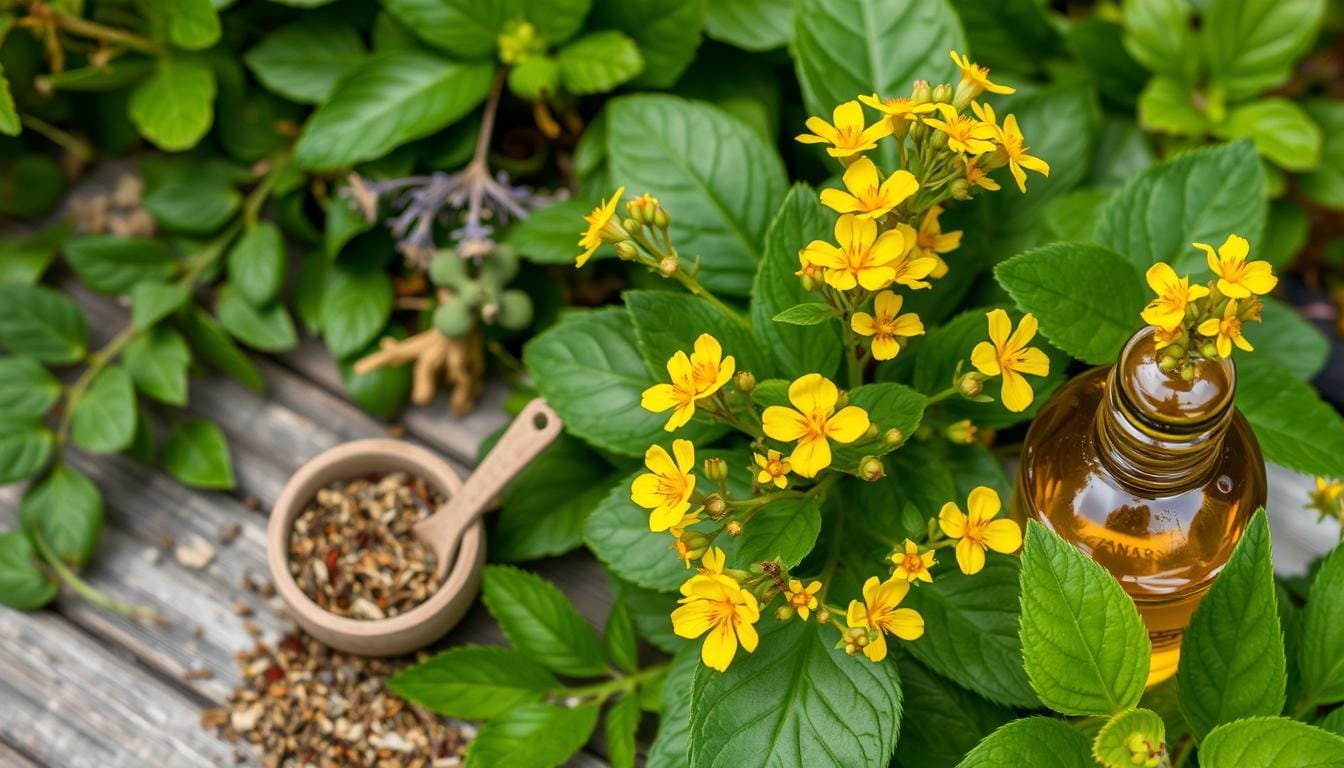I’ve always been curious about natural remedies, and St. John’s Wort caught my eye. It’s an herbal supplement that might help with mood and mental health. This plant has been used for medicine for thousands of years, starting in ancient Greece. Today, research shows it could be a natural antidepressant for mild to moderate depression.
So, what’s so great about St. John’s Wort? It has compounds like hypericin and hyperforin. These might help balance brain chemicals like serotonin and dopamine. Studies say it works as well as some prescription antidepressants for mild depression, but with fewer side effects. It might also help with PMS, SAD, and OCD in some people.
I’m excited to learn more about St. John’s Wort for mood issues. It could help with mild depression, PMS, or just general mental health. But remember, always talk to your doctor before trying any new supplement. They can help you figure out if it’s safe for you and if it might interact with other medicines. The early research looks promising, and I’m looking forward to diving deeper into its benefits.
Understanding St. John’s Wort: A Historical Perspective
Hypericum perforatum, also known as St. John’s wort, has been used for centuries. It has a rich history in herbal medicine and traditional practices. This plant is known for its diverse uses and cultural importance.
Traditional Uses Throughout History
St. John’s wort has been valued for its healing properties for thousands of years. It was used in ancient Greek and Roman times to treat many issues. These included nervous disorders, wounds, and kidney troubles.
It’s known as a natural mood booster and protector. Many folk tales surround its healing powers.
Origin and Botanical Characteristics
Hypericum perforatum grows in Europe, Asia, and the western United States. It’s a shrubby plant with bright yellow flowers. These flowers bloom around June 24th, St. John the Baptist’s feast day.
The flowers and leaves are used for medicine. They contain hypericin, hyperforin, and flavonoids, which are active compounds.
How the Plant Got Its Name
The name “St. John’s wort” comes from its blooming around St. John the Baptist’s feast day. This connection with the saint has made it culturally significant. It’s also tied to pre-Christian and early Christian practices.
“St. John’s wort has been used medicinally for thousands of years, for nervous disorders.”
Benefits of St. John’s Wort: Scientific Evidence and Research
Many studies have looked into St. John’s Wort’s effects on mood disorders. The research shows it might be a good natural choice for mild to moderate depression.
A 2017 review found St. John’s Wort works as well as some antidepressants for mild to moderate depression. A 2016 review also showed it beats a placebo for treating mild or moderate depression.
St. John’s Wort might also help with premenstrual syndrome (PMS), menopausal symptoms, seasonal affective disorder (SAD), and minor skin conditions. It could also aid in obsessive-compulsive disorder (OCD) and social phobia, but more research is needed.

“St. John’s wort has shown promise in treating mild to moderate depression, with benefits comparable to some antidepressants. But, results for severe depression are unclear.”
While the evidence is promising, more research is needed to fully understand St. John’s Wort’s efficacy. It’s wise to talk to a healthcare provider before using it, if you have mood disorders or are on other medications.
How St. John’s Wort Works in the Brain
The exact way St. John’s Wort works is not fully known. But, it’s thought to act like selective serotonin reuptake inhibitors (SSRIs). This herb seems to boost key neurotransmitters in the brain. These include serotonin, dopamine, and norepinephrine, which are vital for mood control.
Role of Hyperforin and Hypericin
At first, people thought hypericin was the main active part of St. John’s Wort. But, research now points to hyperforin as more important for its mood-boosting effects. Hyperforin helps stop these neurotransmitters from being taken back by the brain, making them more available.
Impact on Neurotransmitters
- St. John’s Wort boosts the activity of serotonin, dopamine, and norepinephrine. These neurotransmitters are linked to mood, focus, and energy.
- By making these brain chemicals more available, St. John’s Wort may help with mild to moderate depression. It can also improve emotional well-being.
Serotonin Regulation Process
St. John’s Wort is thought to help mood by affecting the serotonin system. It seems to stop serotonin from being taken back by the brain. This lets more serotonin stay in the brain, helping to stabilize mood and reduce depression symptoms.
“A 2022 review found that St. John’s Wort was more effective than a placebo in treating mild to moderate depression. Some studies showed it worked as well as SSRIs.”
Natural Support for Mild to Moderate Depression
If you’re looking for a different way to treat depression, St. John’s wort might be a good choice. This plant has been used for centuries to help with mood. Studies show it works as well as some medicines but with fewer side effects.
One review of 35 studies found St. John’s wort helps with mild and moderate depression. It works as well as some prescription drugs. In a study, people taking St. John’s wort saw a 56.6% drop in depression scores. Those on standard antidepressants saw a 44.8% drop.
But, St. John’s wort isn’t proven to work for severe depression. It may take 3 to 6 weeks to notice effects. Always talk to a healthcare provider before trying it, as it can affect other medicines.
“St. John’s wort has shown promising results as a natural alternative for mild to moderate depression, providing a more gentle approach with fewer side effects compared to prescription antidepressants.”
St. John’s wort could be a good alternative depression treatment, but use it carefully. It affects mood by balancing serotonin and dopamine. But, it can also interact with many medicines, like birth control and HIV/AIDS drugs.
If you want to try natural mood boosters, St. John’s wort is worth considering. But, always talk to your doctor to find the safest and most effective option for you.
Managing Menopausal Symptoms with St. John’s Wort
Women going through menopause often look for natural ways to ease their symptoms. Research shows that St. John’s wort, an ancient herb, might help with hot flashes and mood swings.
Relief from Hot Flashes
Hot flashes are a big problem for many women during menopause. A study with 100 women showed that St. John’s wort cut down hot flashes by a lot after 8 weeks. This suggests it could be a natural way to handle this symptom.
Mood Stabilization During Menopause
Menopause can also mess with your mood, causing mood swings and irritability. Studies indicate that St. John’s wort might help with mood issues. Women in a study on perimenopause who took St. John’s wort slept better and felt better about their menopause experience.
Even though the research looks good, we need more studies to confirm St. John’s wort’s benefits. But for women looking for natural relief, it’s something to talk about with their doctor.

“St. John’s wort has been used as a remedy for nervous conditions for centuries, with documented medicinal use by the Greeks and Romans.”
Topical Applications and Skin Health Benefits
St. John’s wort is known for its mood benefits, but it also helps the skin. It has antibacterial and anti-inflammatory properties. These make it great for treating various skin issues.
St. John’s wort oil can soothe minor wounds, burns, and irritations. Its compounds, hyperforin and hypericin, aid in healing and soothing. This makes it a top choice for natural skincare, helping with wound healing, inflammation, and more.
St. John’s wort has long been used for skin problems like eczema and hemorrhoids. It’s also in some skincare products for its natural benefits.
“Saint John’s wort oil acts as a pain reliever for soreness and inflammation in muscles, joints, and nerves, with reported benefits including relief from conditions such as sciatica, arthritis, myalgia, gout, and rheumatism.”
But, using St. John’s wort on the skin can make it more sensitive to sunlight. So, use it with care and protect your skin from the sun.
St. John’s wort is a great addition to natural skincare. It offers relief for many skin issues and promotes overall skin health.
Proper Dosage and Administration Guidelines
Using St. John’s wort for mood support is important. It’s available in many forms like capsules, tablets, tinctures, teas, and topical creams.
Different Forms Available
The most common form is standardized extracts in capsules or tablets. These extracts have a set amount of active compounds like hypericin and hyperforin. This ensures the product’s strength is consistent.
Recommended Daily Intake
The usual dose is 300 mg, taken three times a day. This amount should be from a product with 0.3% hypericin. Always check the label for the correct dosage, as it can differ between brands.
Duration of Treatment
St. John’s wort may take 3-6 weeks to fully work. The treatment length can change based on your needs and symptoms. Always talk to a healthcare professional before starting any new supplement.
Following the right dosage and administration is vital for St. John’s wort’s safety and effectiveness. By sticking to the guidelines and getting advice from a healthcare professional, you can get the most out of this natural mood booster.

Safety Considerations and Possible Side Effects
St. John’s wort is usually safe for short use. But, it can cause some side effects. These include stomach upset, skin rashes, and feeling tired or restless.
It might also lead to headaches, dry mouth, and feeling dizzy. People with fair skin may get sunburned more easily.
There are bigger worries too. It could affect fertility or make ADHD symptoms worse. It might also raise the risk of psychosis in people with schizophrenia.
It could even help dementia grow in those with Alzheimer’s. Pregnant women and nursing moms should not take it. They should stop using it at least 5 days before surgery.
| Side Effect | Incidence |
|---|---|
| Stomach Upset | Common |
| Skin Rashes | Common |
| Fatigue | Common |
| Restlessness | Uncommon |
| Headache | Common |
| Dry Mouth | Uncommon |
| Dizziness | Common |
| Mental Confusion | Uncommon |
| Photosensitivity | Common in Fair-Skinned Individuals |
Always talk to a doctor before using St. John’s wort. This is true if you have health issues or take other medicines. They can help you use it safely and right.

Drug Interactions and Precautions
St. John’s wort has many benefits, but it can also interact with medications. This natural supplement can change how many drugs work. It’s important to know about these risks.
Medications to Avoid
- Antidepressants: St. John’s wort can make antidepressants less effective. It also raises the risk of serotonin syndrome.
- Certain HIV medications: It can affect how HIV treatments are absorbed and broken down. This might make them less effective.
- Blood thinners like warfarin: St. John’s wort may reduce warfarin’s ability to thin blood. This could increase the risk of blood clots or bleeding.
- Birth control pills: It can make hormonal contraceptives less effective. This might lead to unplanned pregnancies.
- Heart medications: Some heart drugs, like digoxin, may be affected by St. John’s wort. This might require adjusting the dosage.
- Cancer treatments: It can change how some chemotherapy drugs work. This might make them less effective.
Special Population Considerations
Some people should be careful or avoid St. John’s wort:
- Individuals with bipolar disorder: St. John’s wort may trigger mania in those with bipolar disorder.
- Children and adolescents: There’s not enough research on St. John’s wort’s safety and effectiveness in young people.
- Pregnant and breastfeeding women: Avoid St. John’s wort during pregnancy and breastfeeding. It could pose risks to the fetus or baby.
- Patients with severe depression: For severe depression, St. John’s wort might not be the best choice. Always seek medical advice.
Talking openly with your healthcare provider is key. Make sure to list all medications and supplements, including St. John’s wort. This helps ensure your health is managed safely and effectively.
Choosing Quality St. John’s Wort Supplements
When picking St. John’s wort supplements, look for high-quality products. Make sure they are standardized to have 0.3% hypericin. This ensures the supplement works well.
Choose supplements from trusted brands. They should clearly list the herb’s name, the maker, batch number, expiration date, and how to use it. This shows you’re getting a reliable product.
Also, pick supplements that have been tested by third parties. This check helps avoid bad products. It ensures the supplement is safe and works as it should.
Be careful of exaggerated claims or products that seem too good. Always talk to a healthcare provider before starting any new supplement. This is true if you have health issues or take medicines.
| Supplement Quality Factors | Explanation |
|---|---|
| Standardized Extracts | Look for supplements containing 0.3% hypericin, the key active compound in St. John’s wort. |
| Reputable Brands | Choose supplements from well-known, trustworthy manufacturers with transparent labeling. |
| Third-Party Testing | Opt for products that have undergone independent testing for quality, purity, and consistency. |
By focusing on quality, you can trust your St. John’s wort supplement. It will help support your mood naturally.
When Not to Take St. John’s Wort
St. John’s Wort can help with mood for many people. But, there are times when you should not take it. If you have bipolar disorder, severe depression, or schizophrenia, it’s best to avoid it. It might make your condition worse.
Pregnant and breastfeeding women should not use St. John’s Wort. There’s not enough research to prove it’s safe for them. People with liver disease, Parkinson’s disease, or HIV/AIDS should also stay away. It could interact with their medications and affect their health.
It’s also important to stop using St. John’s Wort two weeks before surgery. It can affect anesthesia and increase the risk of bleeding. This is a serious consideration for your safety.
St. John’s Wort can also interact with prescription medications. If you’re taking antidepressants, birth control pills, blood thinners, or certain HIV and cancer treatments, talk to your doctor first. It can make these medications less effective, which could be dangerous. Always check with your doctor before adding St. John’s Wort to your routine.
FAQ
What is St. John’s wort and how has it been used medicinally?
How effective is St. John’s wort for treating depression?
What are the possible benefits of St. John’s wort beyond depression?
How does St. John’s wort work in the brain?
How long does it take for St. John’s wort to have noticeable effects?
Can St. John’s wort help with menopausal symptoms?
How can St. John’s wort be used for skin health?
What are the common forms and dosage guidelines for St. John’s wort?
What are the possible side effects and safety concerns with St. John’s wort?
What medications and health conditions are incompatible with St. John’s wort?
How can I choose a quality St. John’s wort supplement?
When should I avoid taking St. John’s wort?
Source Links
- https://www.mountsinai.org/health-library/herb/st-johns-wort
- https://www.mayoclinic.org/drugs-supplements-st-johns-wort/art-20362212
- https://www.webmd.com/vitamins/ai/ingredientmono-329/st-johns-wort
- https://www.ncbi.nlm.nih.gov/books/NBK557465/
- https://www.healthline.com/health-news/is-st-johns-wort-safe-080615
- https://www.medicalnewstoday.com/articles/174928
- https://www.verywellhealth.com/everything-you-need-to-know-about-st-johns-wort-7556278
- https://www.webmd.com/depression/st-johns-wort
- https://www.verywellmind.com/st-johns-wort-a2-89959
- https://my.clevelandclinic.org/health/drugs/9304-st–johns-wort
- https://www.healthline.com/nutrition/st-johns-wort
- https://www.mayoclinic.org/diseases-conditions/depression/expert-answers/natural-remedies-for-depression/faq-20058026
- https://www.menopausenaturalsolutions.com/blog/st-johns-wort
- https://futureyouhealth.com/knowledge-centre/st-johns-wort-and-menopause
- https://khelaherbs.com/blog/5-skin-benefits-of-st-johns-wort-oil
- https://www.thieme-connect.com/products/ejournals/pdf/10.1055/s-0033-1351019.pdf
- https://patient.info/doctor/st-johns-wort
- https://www.blackdoginstitute.org.au/wp-content/uploads/2022/06/St-Johns-Worts-treatment.pdf
- https://www.rxlist.com/supplements/st_johns_wort.htm
- https://www.webmd.com/drugs/2/drug-1773/st-johns-wort-oral/details
- https://www.healthline.com/health/st-johns-wort-anxiety
- https://pmc.ncbi.nlm.nih.gov/articles/PMC9587902/
- https://fullscript.com/blog/st-johns-wort







